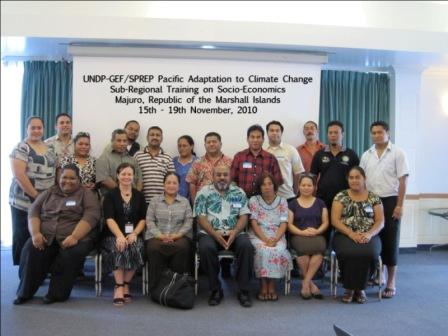
The GEF funded UNDP/SPREP Pacific Adaptation to Climate Change Project undertook its second Sub-Regional Training on Socioeconomics Assessment (SEA) Guide from the 15th to the 19th of November, 2010 at Majuro, Republic of the Marshall Islands.
This is the second of three sub-regional trainings planned after the completion of the SEA-PACC Guide presented at the first Multi-Partite Review Meeting in May 2010. The three workshops were divided according to the three groups of countries addressing the same PACC sectors.
The second sub-regional training was carried out in collaboration with the Office of Environment Protection and Policy Coordination (OEPPC), which focused primarily on the coastal sector directly assisting PACC National Coordinators to understand how socioeconomics will fit into the overall vulnerability and adaptation planning framework. Participants were led through the SEA-PACC process using the RMI demo site to conduct on-site assessment.

"Major highlights were the participants' ability to apply their SEA skills in an actual field survey demonstrated in one of the RMI pilot sites, carrying out the survey at the pilot site in Laura, meeting the people in the communities, and learning about their non-climate related issues as well, experiencing the unique lifestyle of the people of RMI from the rural to the urban Majuro Atoll", said PACC Project Officer Peni Leavai.
"Present at the training were representatives from each of the water-sector focused countries - RMI, Nauru, Niue, Tonga and Tuvalu, as well as the Integrated Water Resources Management (IWRM) Project Manager Marc Wilson from the Pacific Islands Applied Geosciences Commission (SOPAC), and the IWRM Coordinator from Palau and RMI".
Representatives from each of the countries consisted of the PACC National Coordinator and a nominee from the PACC Focal Point who dealt directly with vulnerability and adaptation assessments at the PACC pilot sites. This was to ensure that capacity built during the training will be directly utilised on the ground post training.
During the sub-regional meet, Coordinators were trained on the PACC Socioeconomic (SEA-PACC) Guide that include purposes and methodological procedures, understand how the SEA-PACC fits into the overall vulnerability and adaptation planning framework to strengthen capacity. Specific in-country situations in relation to SEA-PACC such as project sites were discussed with Coordinators, they were provided an opportunity for cross-country discussions and deliberations, and carry out a pilot socioeconomic assessment and analysis.
Leavai said, "Interactive activities in the trainings proved effective in learning the SEA PACC process and requirements; getting down to understanding the definitions of key climate change terms such as vulnerability, adaptive capacity proved very useful in attaining everyone's understanding at the same level and allowed for the training to proceed at a faster pace; and knowing, understanding and appreciating the local knowledge, the way things are planned, communicated locally and in the local context, is key in a successful implementation of a socio-economic assessment."
"The overall outcome of the training was good. Continuous monitoring and back stopping by the regional office of the national project management teams and their technical teams carrying out SEA surveys is required, especially for the water sector countries. This includes a robust monitoring of the SEA process and its successful outcomes, evaluating the results and its contribution to the outputs and outcomes of the project".
The third and last of the Sub-Regional SEA-PACC Training will be held in Koror, Republic of Palau from the 13th to the 17th of December, 2010 focusing primarily on the Food Security Sector of the PACC Project.